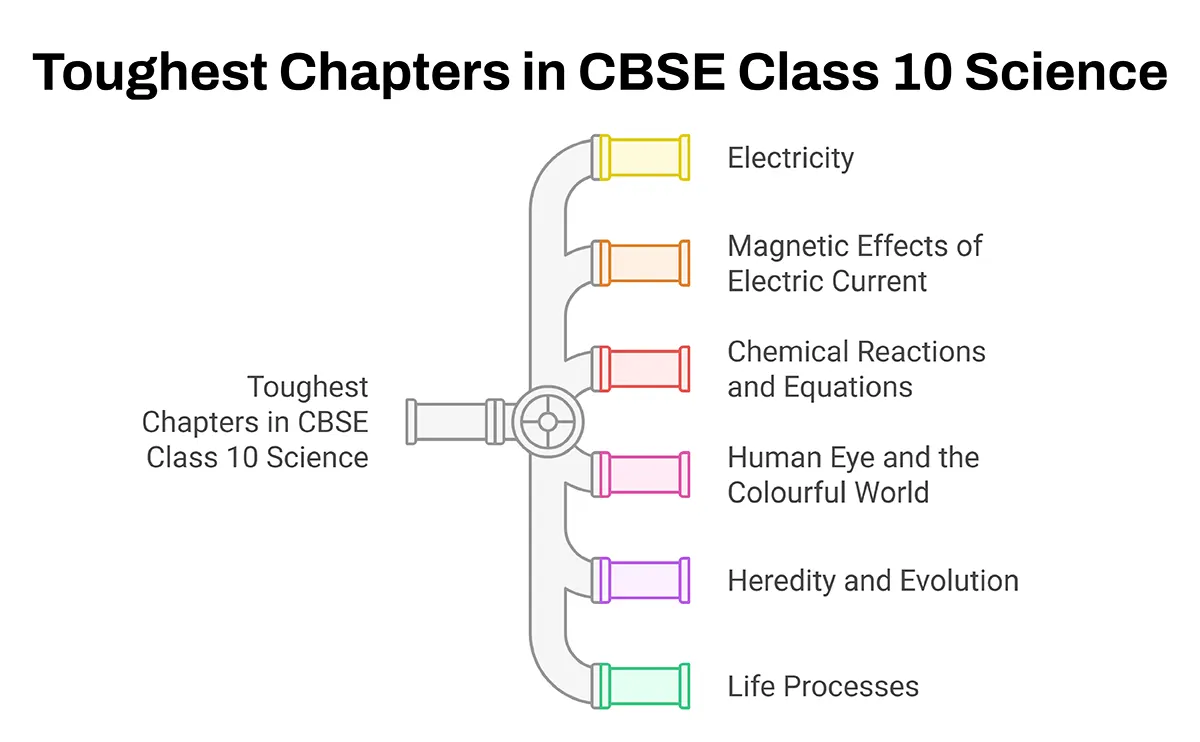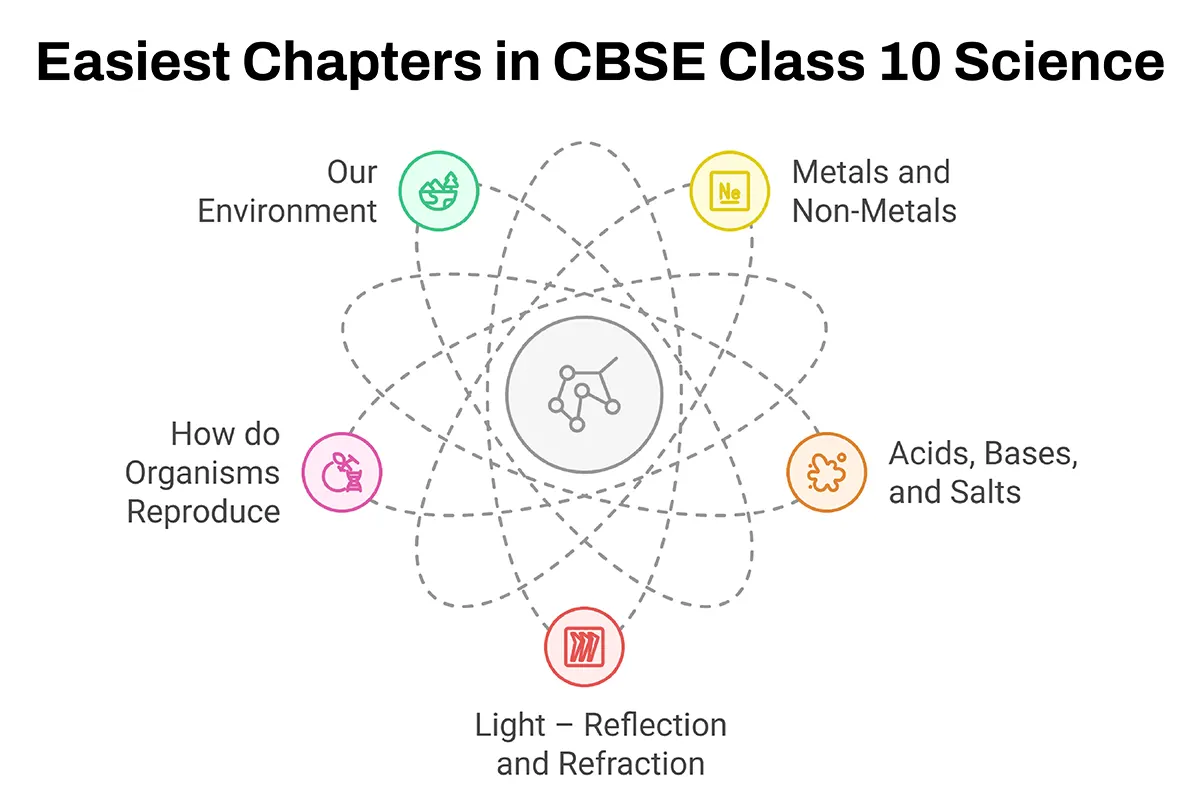Toughest and Easiest Chapters in CBSE Class 10 Science: Scoring well in CBSE Class 10 Science is a top priority for students preparing for board exams. This subject builds a strong foundation for higher studies in Science and enhances analytical and problem-solving skills—both essential for academic success. The CBSE Class 10 Science syllabus covers a diverse range of topics in Physics, Chemistry, and Biology, making it both comprehensive and challenging.
However, not all Class 10 Science chapters have the same difficulty level. Some require deep conceptual understanding and practice, while others are easier due to their straightforward theories and real-life applications. Understanding which science class 10 chapters are tough and which are easy helps students create an effective study plan.
In this blog, we’ll explore the toughest and easiest chapters in CBSE Class 10 Science, and expert tips to help students score high in the exam.
CBSE Class 10 Science All Chapters
Before discussing ‘Which are the toughest chapters in Class 10 Science?’ and ‘Which are the easiest CBSE chapters in Class 10 Science?’, let’s look at the complete chapter list:
| Unit I | Chemical Substances – Nature and Behaviour | Chemical reactions |
| Acids, bases and salts | ||
| Metals and nonmetals | ||
| Carbon compounds | ||
| Unit II: | World of Living | Life processes |
| Control and co-ordination in animals and plants | ||
| Reproduction | ||
| Heredity and Evolution | ||
| Unit III | Natural Phenomena | Light – Reflection and Refraction |
| The Human Eye and the Colourful World | ||
| Unit IV | Effects of Current | Electricity |
| Magnetic effects of current | ||
| Unit V | Natural Resources | Our environment |
Understanding the Class 10th Science weightage for each chapter can help students focus on high-scoring topics while managing their time effectively.
Toughest Chapters in CBSE Class 10 Science

While difficulty varies for each student, some chapters are generally considered the toughest chapters in CBSE Class 10 Science due to complex concepts and numerical problems.
1. Electricity
This chapter requires understanding complicated concepts of Ohm’s law, electrical circuits, resistance and power, their diagrams, and related numerical problems. Combining theoretical understanding and mathematical calculations can make this one of the tough chapters in class 10 science.
2. Magnetic Effects of Electric Current
This physics chapter covers concepts like electromagnets, Fleming’s left-hand rule, and the working of electric motors. Understanding diagrams and applications is essential for this chapter. Exploring the effects of electric current can be complicated and confusing for some students.
3. Chemical Reactions and Equations
This chapter deals with the fundamentals of chemical changes, including different types of reactions such as combination, decomposition, displacement, and redox reactions. It also covers balancing chemical equations, which require logical thinking and constant practice.
4. Human Eye and the Colourful World
It covers the complex structure of the human eye, its key components, and their functions. It also explores light-related phenomena like reflection, refraction, and dispersion to illustrate how vision and colour perception work. The combination of biology and physics can be challenging for some students.
5. Heredity and Evolution
This chapter deals with genetics, Mendelian laws, and evolution theories. Complex mechanisms like DNA replication, gene expression, natural selection, and technical terms like alleles, chromosomes, and mutation can overwhelm some students.
6. Life Processes:
This chapter includes essential processes for living organisms, like nutrition, respiration, transportation, and excretion. It requires a thorough understanding of biological concepts and processes.
Also Check: Benefits of Practicing CBSE Class 10 Sample Papers for 2025 Exams
Easiest Chapters in CBSE Class 10 Science

Some science chapters are easy and require less effort to understand and memorise. Here are some of the easiest chapters in CBSE Class 10 science:
1. Metals and Non-Metals
This chapter covers the physical and chemical properties of metals and non-metals, their reactions with air, water, acids, and bases, and basic concepts like metallic bonding and corrosion. As these concepts are mostly theoretical with real-life applications, many students find this as one of the easiest chapters in class 10 science.
2. Acids, Bases, and Salts
The simple chemical properties of acids and bases, their reactions, and real-life applications make this chapter easy to learn. Most student find concepts like pH scale, indicators, types of acids and bases, and their common uses easy to understand and memorise.
3. Light – Reflection and Refraction
This chapter is comparatively easy because it covers fundamental concepts of how light behaves when interacting with mirrors and lenses. It involves simple formulas, ray diagrams, and real-life applications—making it easy to understand. With minimal calculations and more visual learning, students find it manageable and scoring.
4. How do Organisms Reproduce
This chapter focuses on the mechanisms of reproduction in plants and animals. The concepts of sexual and asexual reproduction are quite straightforward. Students need to memorise this theoretical chapter— reproductive organs, processes, and the significance of reproduction, which makes it easier to understand.
5. Our Environment
This chapter focuses on environmental issues, ecosystems, and food chains. This primarily covers theoretical concepts and doesn’t involve complex problem-solving.
Also Read: How to Prepare for the CBSE Class 10 Maths Exam?
Tips to Score Good Marks in Class 10 Science Exam
Here are some effective tips to excel in the class 10 Science exam:
1. Understand the Exam Pattern and Weightage
Understanding the exam pattern and chapter weightage is essential for effective preparation. Go through the CBSE syllabus and exam pattern. You can also refer to Science sample papers. Identify the chapters in the science syllabus that carry high weight. Based on that, you can focus more on high-scoring chapters.
2. Focus on Conceptual Clarity
Conceptual clarity is important for scoring in Science. Instead of rote learning, try to understand the logic behind every concept. The use of diagrams, flowcharts, and tables can help improve understanding and retention.
3. Practice Numerical Problems Regularly
Regular practice of numerical problems is essential, especially for Physics and Chemistry. Many students struggle with problem-solving. Practising questions from previous years’ papers and reference books can help improve accuracy and speed.
4. Revision
Regular revision with NCERT books is crucial. As NCERT books cover 80-90% of the board exam syllabus, going through them ensures that most of the important topics are covered. Solving sample papers and previous years’ question papers also helps students become familiar with the exam pattern and boosts confidence.
5. Use Mnemonics and Tricks for Memorisation
Some topics, like formulas, periodic table trends, and organic chemistry reactions, can be difficult for students to remember. Using mnemonics, acronyms, and memory tricks can help students remember such topics and make learning easier.
6. Time Management During the Exam
To score well in board exams, time management during the exam plays a vital role. Allocate time wisely and ensure you spend more time on high-weightage questions. To gain confidence, start with easier questions and move on to the more challenging ones.
7. Write Answers in a Structured Manner
Answers written in an organised way are easier to read and help score marks. So, use headings, bullet points, and diagrams wherever required. Keep your answers concise and to the point to ensure clarity and avoid unnecessary deductions.
8. Be Calm and Confident
Overthinking and stress can negatively impact performance. Stay positive, take deep breaths, and approach each question with a focused mind. You can also boost your confidence by practising time-bound mock tests. A confident approach will help you recall answers effectively and perform better.
By following these strategies, students can improve their preparation and score better in the Class 10 Science exam.
Conclusion
Science in Class 10 is a balanced mix of theory and practical application. Some chapters, like Electricity and Heredity and Evolution, are considered the toughest chapters in CBSE class 10 science. Most students find them challenging. On the other hand, chapters like Acids, Bases and Salts or Our Environment are conserved as the easiest chapters in CBSE class 10 science. By understanding the difficulty level of each science chapter, students can better plan their study and revision schedule. With the right approach—conceptual clarity, regular practice, and time management, and having the right set of books, they can excel in the exam and score high marks in Science.
Checkout Useful Resources:
| CBSE Class 10th Books | CBSE 10th Class Question Banks |
| CBSE Class 10th Sample Papers | CBSE Class 10th Solved Papers |
FAQs
Q1. Which are the toughest chapters in CBSE class 10 science?
Ans – The toughness of chapters varies for different students. Chapters like Electricity, Magnetic Effects of Electric Current, Chemical Reactions and Equations, Heredity, etc., are often considered the toughest chapters in CBSE Class 10 Science due to complicated concepts and numerical problems.
Q2. Which are the easiest chapters in CBSE Class 10 Science?
Ans – Chapters like Our Environment, Reproduce, Acids, Bases and Salts, and Metals and Non-metals are some of the easiest chapters in CBSE Class 10 Science due to their straightforward concepts.
Q3. How can I score well in Class 10 Science?
Ans – You can score well by focusing on conceptual understanding, practising numerical problems, revising NCERT content, and solving previous years’ question papers.
Q4. How many chapters in science class 10?
Ans – There are a total of 16 chapters in the CBSE Class 10 Science syllabus comprising all Physics, Chemistry, and Biology.


